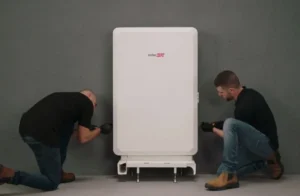In a potentially far-reaching decision, the European Commission has decided that the French system of feed-in tariffs for wind energy on land is not excluded under prohibitions against “state aid,” and is therefore permitted under European Union (EU) regulations.
 The long-awaited decision couldn’t come at a better time. Though the decision is consistent with past EU rulings on feed-in tariffs, recent comments by the Commission’s Directorate General for Competition against feed-in tariffs (FITs) has signaled a return to FIT bashing by the Commission’s powerful bureaucrats. This had put the decision on French wind FITs in doubt.
The long-awaited decision couldn’t come at a better time. Though the decision is consistent with past EU rulings on feed-in tariffs, recent comments by the Commission’s Directorate General for Competition against feed-in tariffs (FITs) has signaled a return to FIT bashing by the Commission’s powerful bureaucrats. This had put the decision on French wind FITs in doubt.
The positive outcome in this case demonstrates that not only are feed-in tariffs for wind energy permissible, but—by extension–wind tariffs differentiated by wind turbine performance are also permissible.
France and Germany both use wind tariffs that are differentiated by wind resource intensity. Wind turbines in areas with low to moderate winds are paid more per kilowatt-hour than wind turbines in windy regions. Both countries use these differentiated tariffs to disperse wind development geographically. This not only spreads economic opportunity to all regions, but it also reduces land use conflicts when wind development is concentrated only in the most windy areas along the coast or on mountaintops.
The decision follows a European Court of Justice ruling in December of last year that the French system was state aid. Most forms of “state aid” are prohibited within the EU as inimical to free cross-border trade, the purpose of the Union.
The case had been brought by an anti-wind energy lobby group, Vent De Colère, in hopes of stopping the growth of wind energy in France. While the two decisions appear contradictory, they are internally consistent. The Court’s ruling was based on exemptions to certain industries from the surcharge (Contribution au Service Public de l’Electricité” or CSPE) on ratepayers used to pay for the feed-in tariffs. The Court ruled that the exemption from the CSPE to these industries was state aid.
The Court had previously ruled in the PreussenElektra case challenging Germany’s original feed-in tariff, the Stromeinspeisungsgesetz, that the policy did not constitute prohibited state aid. (The former PreussenElektra now goes by the moniker E.ON.) The ruling has since been upheld in a similar challenge to Austria’s feed-in tariffs.
The Court ruled in these cases that state aid is defined in the treaty of union “as “advantages granted directly or indirectly through State resources.” They went on to explain that states can grant advantages as along as they are not from “State resources,” that is funds collected from taxpayers (or, presumably, not collected from taxpayers in the form of tax credits) and distributed by the state. (State aid from a state’s monetary resources meets the classic definition of a subsidy.) Requiring a utility to purchase renewable energy at a fixed-price set by the state is not the same as paying for the electricity from state resources, and is, therefore, not state aid, and is permissible.
Toby Couture, one of the world’s leading authorities on feed-in tariffs has written about the EU’s definition of state aid and where FITs fall in this verbal landscape in one of his Analytical Briefs. The Commission’s ruling is consistent with its previous decisions.
Though analysts, such as Couture, anticipated a favorable decision in favor of the French wind tariffs, the legal uncertainty in France accomplished what Vent De Colère could not do legitimately: stop new wind projects from proceeding. The state aid case coupled with new discriminatory policies toward wind energy have cut the growth of French wind energy nearly in half from that in 2010. In the past two years, wind development in France has fallen behind Great Britain, one of Europe’s renewable energy laggards. In 2013, France installed only one-third as much wind energy as Britain.







